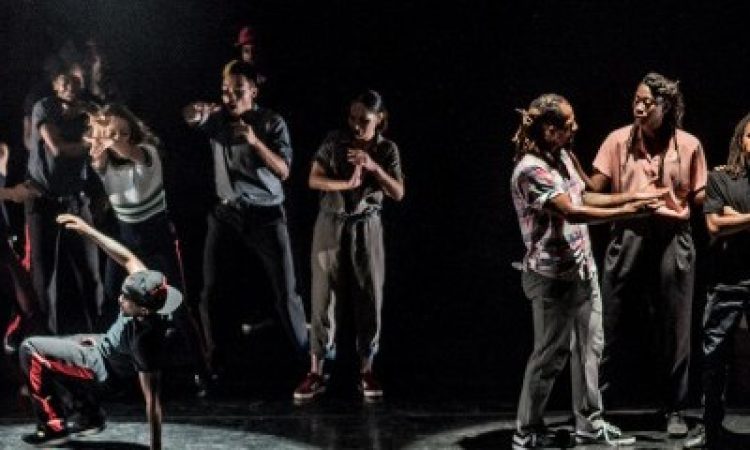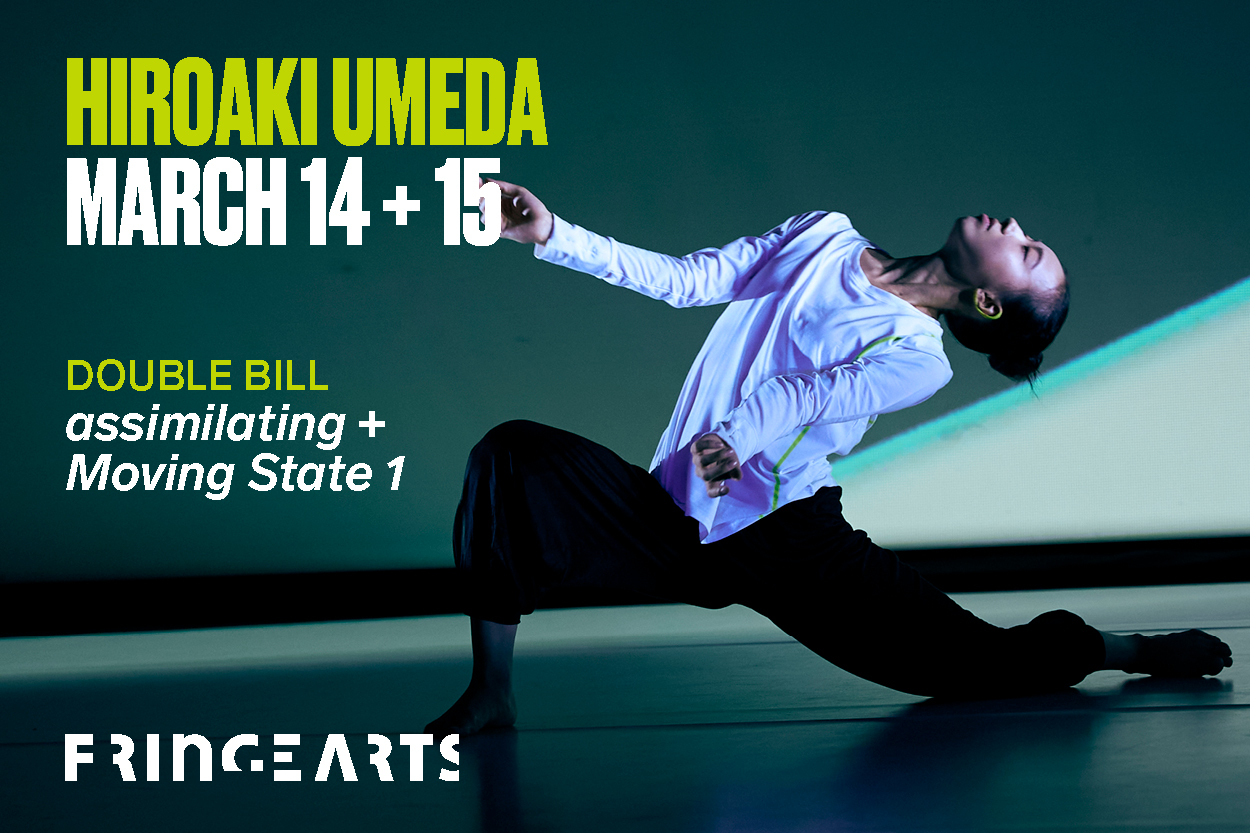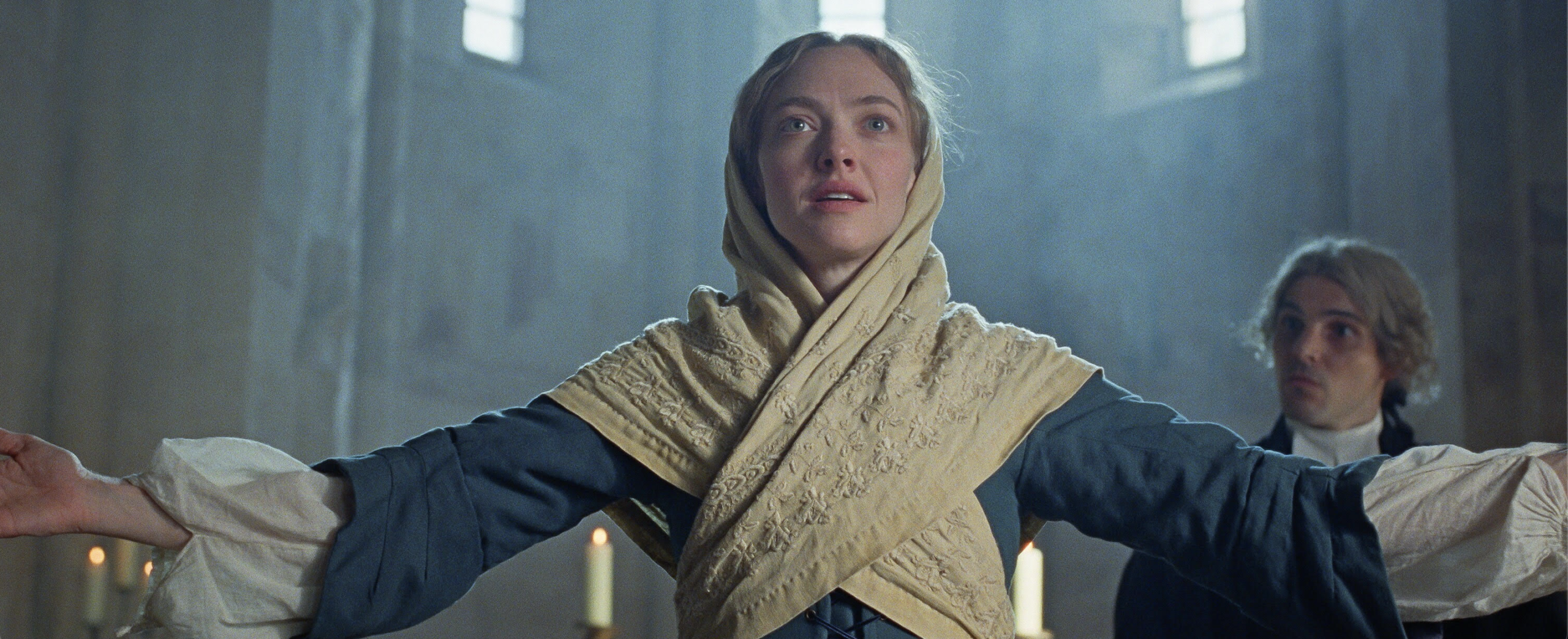As I walk down the aisle of the Zellerbach Theater, it is clear I’m entering a church this evening. The stage hosts stained glass lighting designs, a pianist, choir risers, pews, and a pulpit. The pianist and small gospel choir, Alonzo Chadwick & Friends, plays us to our seats.
We are here to witness Rennie Harris: Lifted, a dance theater piece—a parable of sorts that blends Dickens’ Oliver Twist with a sermon that tells the story about a lost boy, Joshua, trying to find his way back into community.
Harris, known for pioneering hip hop in the concert dance canon, manages to recontextualize Dickens’ story inside current events by projecting quick newsreel clips of police shootings of innocent Black men from the 2010s onto the screen. While these jumbled up images and sound bites play, the main character Josh, portrayed by Joshua Culbreath, is fighting with his aunt and uncle. In tableaus, they act out an argument, concluding with Josh getting smacked.
Lights rise on Rev CJ, played by Carl Robinson Jr. He speaks to his congregation, the Puremovement performers, who respond with a fast tempoed House dance accompanied by the gospel choir. The dancers’ footwork is rhythmic, engaging, and infused with social dances, like the Whip and Nae Nae, Millie Rock, and Suzie Q. This is a praise dance, uplifting the group in communal rhythm and transcendence.
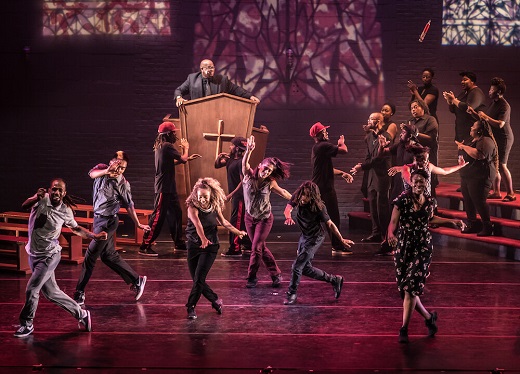
Onstage, a group of smiling Puremovement dancers in a cross step in the foreground; Robinson Jr. on a raised pulpit in the background; and Alonzo Chadwick & Friends clapping and singing on choir risers. Photo: Nikki Carrera
Lifted is more than a dance work. Throughout, I catch myself closing my eyes to let the gospel music lift me onto its transcendent sound waves. With my eyes open, I seek to find meaning in the dancers’ gestures, steps, and the choreographic composition. While the group choreography is energetic and full of meaningful movement codes that reference social dances and movements found in many Black churches, I am most moved by the story: the message, delivered in spoken word, and the emotional journey of the main character, expressed in movement.
Images of North Philly are projected on the screen, as we meet Big Poppa, played by Rodney Mason, and his 40Thieves crew of pickpockets, played by The Hood Lockers.* Big Poppa also presents us with the direct reference to Oliver Twist in his opening rap, “You gotta pick a pocket or two, boiiii! You gotta pick a pocket or two.”
The Hood Lockers, who specialize in funk-styles of hip hop, are standout dancers in Lifted. Infusing some comedic relief into the storyline, this group of four hits the rhythm hard; they are groovy and classic, performing styles like Campbellocking, Popping, and Breaking. Even when they are not the primary focus onstage, my eyes turn towards them, my shoulders grooving with their rhythm.
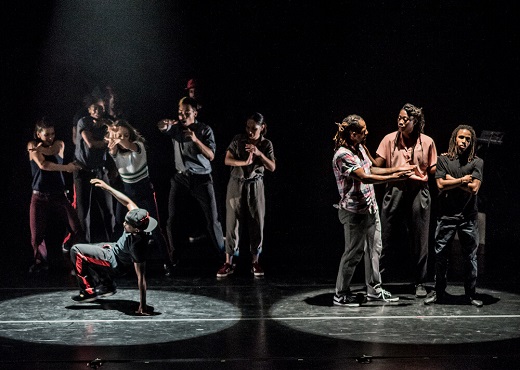
Two pools of light onstage: On the left, one of The Hood Lockers, hand on the ground, feet hovering off the floor, is surrounded by another group of dancers. On the right, the three dancers make a tableau displaying an argument. Photo: Nikki Carrara
If the Rev CJ represents the “good” end of the spectrum in the story, Big Poppa is quickly established as the “evil.” They represent two versions of Black male leadership seeking to influence the same community. However, Harris attempts to subvert the stereotypical narrative that criminalizes Black men and devalues hood culture. In a spoken word monologue, Big Poppa speaks his truth, that the murder of Black men has been going on for too long for it to re-anger or motivate him towards participating in an uplifting narrative of change. Placing the “evil” on systemic and institutionalized racism, while also expressing his frustration, disillusionment, and reasons for stealing, Big Poppa states: “Now it’s my turn, I’m going to go get mine.”
Joshua Culbreath, as Josh, is spectacular in Lifted. During a soulful song sung by Rev CJ (Robinson), Culbreath performs an emotionally moving breakdance solo. Muscles held in bound tension, he winds his body up into a headspin that unravels and collapses. I see his dance as prayer, one that transforms his emotional experiences of loss, frustration, fear, disconnection, and pain into something physically expressive. His mastery of gravity, his suspensions, his freezes, and flips are impressive. He reclaims his bodily agency, producing movements that both yield to and transcend the downward pull of his social circumstances.

One of the Hood Lockers balances on his hands in a breakdance freeze, with head and legs hovering off the floor. Puremovement dancers surround him from behind, arms raised and pointing to him. Photo: Nikki Carrara
The story moves through more conflict before arriving at what seems like an uplifting conclusion: returning Josh to his family and returning the 40Thieves to the church community. In the end, church has a place for everyone. An exception is Big Poppa, who, after his initial monologue, loses touch with his humanity, gradually developing a devilish double voice that echoes throughout the theater. Having turned away this evil from the church, the congregation celebrates and praises together. Lifted concludes in a finale that is now standard among hip hop concert dance performances: dancers bow before entering a communal half-cypher where they solo in the center. The audience rises and claps in a standing ovation, feeling that the piece is over.
But, the lights fade down, focusing on one-second news clips that fast-forwards towards 2020. The audience quiets, many of them still standing, unsure of what to do with this unexpected interruption. As we hear, “the coronavirus ravages the world,” Big Poppa, now fully embodying “evil,” steps up onto the choir’s risers and lets out an animalistic roar. The performers, now in silhouette, are hit with its impact, arms and bodies leaning back, suspended in slow motion. This community once again is blown down by evil’s fiery exhale.
Rennie Harris: Lifted, starring Rennie Harris Puremovement and The Hood Lockers, Penn Live Arts, March 18-19
Direction, Choreography & Writing: Lorenzo Rennie Harris
Lighting Design: Bob Steineck
Musical Composers: Raphael Xavier, Darrin Ross
Sound Design, Musical Direction & Production: Darrin Ross
Set Design: Ben Levine
Master Carpenter: David Knepper
Projections & Visual Design: David Dowling
Choir: Alonzo Chadwick & Friends, Jazmine McCray, Jahdiah Blane Dyson
Narrator/Poet: Wadud Ahmad
Josh: Joshua Culbreath
Rev CJ: Carl Robinson Jr.
Aunt Tah-tah: Elyse Browning
Unc XO: Phillip Cuttino Jr.
Big Poppa: Rodney Mason
Ushers/40Thieves: The Hood Lockers
Rennie Harris Puremovement: Phillip Cuttino Jr., Fyness Mason, Joshua Culbreath, Emily Pietruszka, Marguerite Waller, Rachel Snider, Danzel Thompson-Stout, Kaenan Williams
Apprentice Dancers: Angel Anderson, Jeremy Taylor
Associate Dancers: Michael Manson, Elyse Browning
